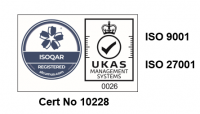Updates to the Rehabilitation of Offenders Act (ROA) and filtering rules from 28th October 2023
October 24th, 2023 by Abbie Tigedi
The Disclosure and Barring Service (DBS) have announced updates to the Rehabilitation of Offenders Act (ROA) and amendments to the filtering rules that will come into force from the 28th of October 2023. These changes and amendments affect what is disclosed on Basic, Standard and Enhanced checks.
Read on to find out about the updates to the Rehabilitation of Offenders Act and filtering rules, how this will affect you and the checks you carry out; and why these changes are happening.
What is the Rehabilitation of Offenders Act?
The Rehabilitation of Offenders Act is a piece of legislation that governs the disclosure of individuals’ criminal convictions when doing a DBS check. It provides a legal framework for convictions to become “spent” after a specified period, allowing individuals with minor offences to move forward without disclosing their past convictions.
Changes to the Rehabilitation of Offenders Act
From the 28th of October 2023, custodial sentences of over 4 years that are not already excluded (such as life sentences or sentences of imprisonment for public protection), will be able to become spent for the first time.
Additionally, the DBS has announced that the rehabilitation periods for some disposals/sentences will be reduced. Example include:
- Custodial sentences of more than 1 year and up to 4 years will now become spent 4 years after the end of the sentence
- Custodial sentences of up to 1 year will now become spent 1 year after the end of the sentence
- Community Orders and Youth Rehabilitation Orders will now become spent at the end of the order.
Exceptions
These updates to the Rehabilitation of Offenders Act do not extend to individuals who have received a sentence of more than 4 years of imprisonment after being convicted of any severe violent, sexual, or terrorist offences. Offences that are not included in the changes to the ROA are listed in Schedule 18 of the Sentencing Act 2020. These convictions will remain unspent and, consequently, will always be subject to disclosure.
DBS Guidance: Rehabilitation Periods
What are DBS filtering rules?
DBS filtering is the process that identifies which convictions will be disclosed on standard and enhanced Disclosures. The DBS will filter out many minor convictions 11 years after they become spent, or 5.5 years for youth convictions. There is a list of specified convictions that will not be filtered and include serious violent convictions or of a sexual nature.
Changes to filtering rules for standard and enhanced DBS checks
Updates to the filtering rules will mean that all records that have not yet become spent will now be disclosed. This means that some applicants will now see additional unspent convictions being disclosed.
These changes will apply to unspent offences, youth conditional cautions, relevant orders, relevant offences and the concept of ‘drag-on’ in both Standard and Enhanced checks.
Scenario 1: Unspent offences, previously undisclosed
An individual working as a support worker has reached their recheck period for their Enhanced DBS check. The individual’s prior Enhanced DBS did not have any information on it.
The new Enhanced DBS check, however, now reveals the existence of an indefinite restraining order issued in 1998. Because this particular order has not lapsed as it remains “unspent”, it is now eligible for disclosure under new filtering rules.
Scenario 2: Youth Conditional Caution on Standard or Enhanced Checks
An individual recently received a Youth Conditional Caution for shoplifting.
Historically such cautions were not included in Enhanced DBS disclosure. This particular caution however remains unspent for a total of 3 months, and will therefore now be disclosed on the individual’s upcoming DBS certificate.
Scenario 3: Relevant Orders and ‘drag-on’
An individual was convicted of Theft and Common Assault on 24 July 2001 and received a Community Order and an indefinite Restraining Order.
This individual is undergoing an Enhanced DBS check with a check of the adult barred list for work. Historically, no information has been disclosed however on this occasion all information from their 2001 conviction is disclosed. This is because of the indefinite Restraining Order which has a ‘drag-on’ effect causing all convictions to remain unspent and therefore subject to disclosure under the new filtering rules.
FAQ: What is a ‘drag on’ effect – When a specific conviction or disposal is considered unspent, it can “drag through” its unspent status to other disposals or convictions linked to it. This means that any associated records, which would otherwise be considered spent, are also treated as unspent as long as the originating conviction remains unspent.
DBS Guidance:
How will these changes impact employers?
In some cases, employers will be privy to more information disclosed in a DBS check than before, including older or previously undisclosed convictions. Employers implementing rechecks as part of their policy may also discover previously undisclosed convictions for individuals already in their workforce. It is important that employers consider the relevance of older convictions and make informed and fair decisions regarding an applicant’s suitability for a role.
How will these changes impact employees/applicants?
Applicants may face increased scrutiny and may need to disclose older convictions that were previously spent or not disclosed. This could impact their job prospects, especially if the convictions are related to the role they are applying for. Additionally, applicants may choose to pursue legal avenues, such as applying to have information made spent or removed, such as restraining orders as mentioned in the scenarios above, to prevent the drag-through effect on their records.
General FAQs
These FAQs represent issues commonly raised with the DBS regarding the updates to the Rehabilitation of Offenders Act so far.
The date on your certificate will tell you which rules have been applied to your check. If the certificate is dated 28th October 2023 or later, then the new rules have been applied. Certificates with any date before the 28th of October will have been processed using the old rules.
The changes to the ROA are designed to support ex-offenders to move on with their lives and enable them to contribute to society by having greater access to employment.
Previously, in some limited circumstances, there were records of unspent convictions and cautions that would be disclosed on Basic checks that wouldn’t appear on Standard and Enhanced checks. Ensuring that all unspent records appear on all levels of DBS checks makes our products easier to understand and will ensure recruitment decisions can be made in light of all of the relevant information.
No, these changes only apply to England and Wales. Where changes are made in Scotland and Northern Ireland, they will be communicated to you by the relevant agency.
We hope this overview provides a clear breakdown of the upcoming ROA updates and their implications for both you and your applicants. For more detailed insights, feel free to reach out to the DBS directly on 0300 0200 190.
Follow us on social media to stay updated.





